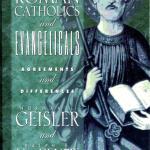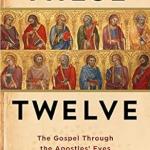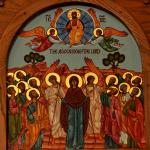Not too many homilies make it into doctoral dissertations. I suspect this one will. Brilliant theology and great communication skills all wrapped into one. I love this guy.
Here’s a wonderful section on the social implications of the Eucharist to whet your appetite:
Saint Augustine helps us to understand the dynamics of Holy Communion when referring to a kind of vision he had, in which Jesus said to him: “I am the food of the mature: grow, then, and you shall eat me. You will not change me into yourself like bodily food; but you will be changed into me”(Confessions, VII, 10, 18). Therefore, while the bodily food is assimilated by the body and contributes to its maintenance, the Eucharist is a different bread: we do not assimilate it, but it assimilates us to itself, so that we become conformed to Jesus Christ and members of his body, one with Him. This is a decisive passage. Indeed, precisely because it is Christ who, in Eucharistic communion, transforms us into Him, our individuality, in this encounter, is opened up, freed from its self-centeredness and placed in the Person of Jesus, who in turn is immersed in the Trinitarian communion. Thus, while the Eucharist unites us to Christ, we open ourselves to others making us members one of another: we are no longer divided, but one thing in Him. Eucharistic communion unites me to the person next to me, and with whom I might not even have a good relationship, but also to my brothers and sisters who are far away, in every corner of the world. Thus the deep sense of social presence of the Church is derived from the Eucharist, as evidenced by the great social saints, who have always been great Eucharistic souls. Those who recognize Jesus in the Blessed Sacrament, recognize their brother who suffers, who is hungry and thirsty, who is a stranger, naked, sick, imprisoned, and they are attentive to every person, committing themselves, in a concrete way, to those who are in need. So from the gift of Christ’s love comes our special responsibility as Christians in building a cohesive, just and fraternal society. Especially in our time when globalization makes us increasingly dependent upon each other, Christianity can and must ensure that this unity will not be built without God, without true Love. This would give way to confusion and individualism, the oppression of some against others. The Gospel has always aimed at the unity of the human family, a unity not imposed from above, or by ideological or economic interests, but from a sense of responsibility towards each other, because we identify ourselves as members of the same body, the body of Christ, because we have learned and continually learn from the Sacrament of the Altar that sharing, love is the path of true justice.
And, as a little bonus, here is Father Robert Barron’s homily, as an audio file, for this eucharistic feast.
May you all experience Christ in the Eucharist in a special way today!
Brett Salkeld is a doctoral student in theology at Regis College in Toronto. He is a father of two (so far) and husband of one.
















